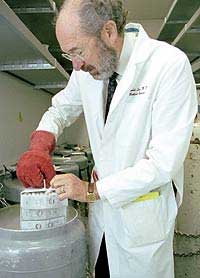Ronald Levy, professor of medicine and former chief of the Division of Oncology at Stanford University School of Medicine, helped develop and test the first US Food and Drug Administration (FDA)-approved monoclonal antibody against cancer for the treatment of B-cell lymphoma. Rituximab is now a standard of treatment alone and also in combination with chemotherapy regimens.

Levy is receiving LLS funding through the Translational Research Program for research into an immunotransplant therapy for mantle cell lymphoma, which tends to have a poor prognosis. Treatment includes high-dose chemotherapy followed by stem cell transplant, which eliminates most of the lymphoma, but temporarily wipes out a patient’s immune system. Residual lymphoma cells often remain and cause the disease to recur within a few years. Levy aims to show that vaccinating a person with their own altered cancer cells can incite a powerful immune response against the disease that eliminates those residual cells. Phase II clinical trials are ongoing and have shown promise.
How would you explain your research and why it has such promise?
Our research looks at how the immune system can be harnessed to fight lymphoma. With this project, we are making a personalized vaccine from each patient’s lymphoma cells and we hope that when we add it to the current treatments it will keep the disease from coming back.